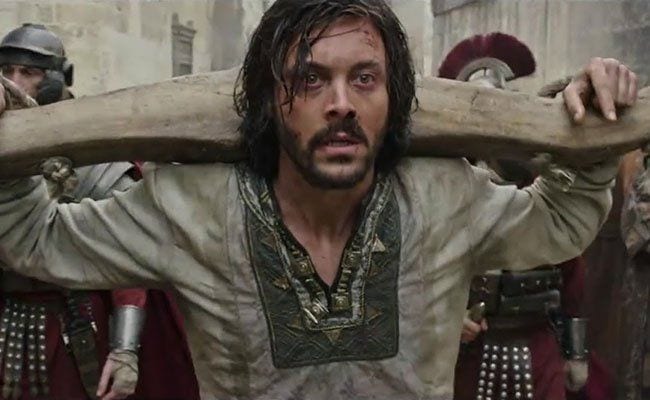
Judah Ben-Hur is back, and this time he’s really… bland. The third cinematic incarnation of Ben-Hur plays like a ‘Cliff’s Notes’ version of the 1959 Heston epic. Director Timur Bekmambetov neither preserves the grandeur of the original story nor adds anything new to the legend. It’s not a catastrophe, exactly, but it’s deadly dull and feels oddly slight. Common sense suggests this was an unnecessary re-make, and the final product proves that Ben-Hur should have left his chariot out in the stable.
Director Bekmambetov (Abraham Lincoln: Vampire Hunter) and his screenwriters, Keith R. Clarke and John Ridley, try to pump up the gravitas by tinkering with the history between Judah Ben-Hur (Jack Huston) and Messala Severus (Toby Kebbell). Instead of being childhood friends from opposite sides of the political and religious fence, the Jewish prince (Hur) and the Roman orphan (Messala) are half-brothers. Yes, it’s the exact same ploy that Ridley Scott tried in his Moses vs. Ramses snoozefest, Exodus: Gods and Kings, and no, it doesn’t work for Bekmambetov, either.
Judah Ben-Hur is anything but a rabble-rouser in this iteration of the rabble-rousing classic. He watches passively as Jewish “zealots” agitate the occupying Roman horde in Jerusalem. There are many speeches about maintaining the peace, most of which are designed to protect his lofty station.
In fact, Judah is passive throughout the entirety of Ben-Hur. Even during the film’s best action scene – the narrow escape from a sinking Roman galley — Judah spends most of his time watching events unfold around him. His natural acumen for the chariot is also neglected, as the extensive training and racing scenes have been eliminated. This version of Judah is just a mopey bastard who owes his survival to a string of blind luck.
Messala doesn’t fare much better. He’s adopted by the House of Hur for reasons that remain cloudy. Later, he decides to join the Roman army for reasons that are even cloudier. He’s neither a true believer nor a contrarian; he’s just Judah’s fated adversary. Their developing feud has all the tension of broken rubber band, and there isn’t enough backstory to understand or care about anyone’s motivations.
In fact, most of the anemic backstory is revealed through narration by the omnipresent Morgan Freeman. It’s hard to tell if Freeman can still disappear into a character, as his voice and face are distractingly familiar. Here, he plays Judah’s chariot racing mentor, Ilderim, who bears more than a passing resemblance to Vitruvius from The LEGO Movie. Judah becomes the passive student, carrying out the orders of his demanding coach. Indeed, Freeman gets nearly as much screen time as Judah Ben-Hur during the climactic chariot race.
Judah’s powerlessness is a direct result of the filmmaker’s indecision. It’s obvious that either Bekmambetov was unclear about the type of film he was making, or his producers pulled him in a different direction. After two hours of drudgery and boredom, it’s still unclear if Ben-Hur is a drama, an action-adventure, or a Biblical lesson.
Two hours isn’t nearly enough time to build an effective drama, so the script is forced to lift major plot points from the 1959 version and patch the gaps with unconvincing melodrama and lots of walking around. It doesn’t help that the love affair between Judah and Esther (Nazanin Boniadi) is deader than a shark’s eyes.
Religion is mostly danced around, though Jesus (Rodrigo Santoro) makes several cameo appearances. Again, the script settles for The Bible’s greatest hits, allowing familiar images and scripture to substitute for genuine insight. It’s religious dogma at its kindest and gentlest.
But what about the action? That chariot race at the end has to be good! Right?
To fairly evaluate Bekmambetov’s staging of this iconic race, we must first accept an obvious truth: The chariot race from the 1959 Ben-Hur is one of the best action sequences ever committed to film. Bekmambetov had no chance of eclipsing William Wyler’s accomplishment. This is due, in large part, to restrictive modern safety standards for actors and animals. Wyler reached a level of genuine peril and intimacy that will never again be seen (thankfully for the actors). Ubiquitous digital effects are also a constant temptation for modern directors, as they save time, money, and eliminate potential carnage.
That said, Bekmambetov settles for imitating Wyler’s vision rather than re-imagining it. Key shots and stunts are reproduced almost frame-for-frame, and much of the drama is diminished by ridiculous trash talking from the secondary racers. Worse still, Bekmambetov insists upon smothering the sonic spectacle with Marco Beltrami’s uninspiring score. What could be more thrilling than thundering hooves crashing around you?
While the new version of Ben-Hur isn’t tragically bad, it has a shorter life expectancy than the wieners in Sausage Party. It’s competently made, with adequate sets, costumes, and performances, but it lacks the thrills, heart, and inspiration to capture the imagination. This is the plodding ghost of a gutted epic that nobody wanted to see.

